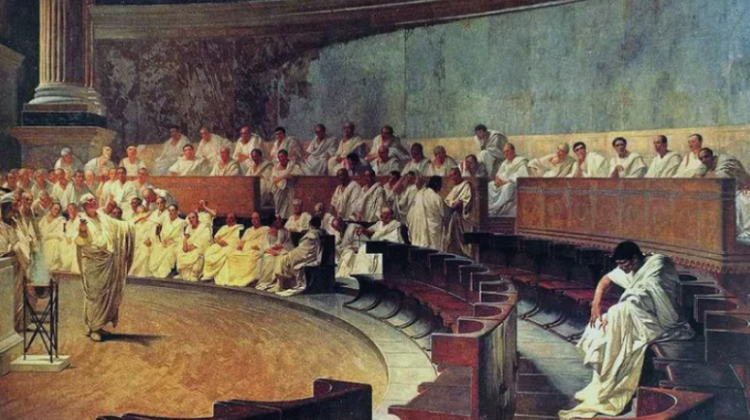DOGE in Ancient Rome
It didn’t end well, and is a sober lesson for us today.

|
Getting your Trinity Audio player ready...
|
Corruption in government is nothing new. Every government has been beset by it to some degree. Many have tried to rid themselves of it, sometimes without success.
Take, for example, this story: a great nation, indeed, the world’s only superpower, is beset by turmoil, as a corrupt political class grows more interested in enriching itself than in performing any actual public service. Finally, a new leader emerges who has a long and distinguished record in other fields, but is not a career politician.
The non-politician strikes a chord with citizens who are tired of the corrupt status quo. Many of them saw potential in this unlikely reformer and manage to secure the top spot for him, but the corrupt elements are supremely powerful and deeply entrenched. They refuse to accept the new leader, and fight back fiercely against his efforts to restore competence and honesty to the government.
No, I am not talking about Donald Trump. This is the story of Publius Helvius Pertinax, emperor of Rome from Jan. 1, 193 to Mar. 28, 193. In his all too brief reign at the helm of the Roman Empire, Pertinax tried to reform the corrupt system. A contemporary, the historian and Roman Senator Cassius Dio, said that Pertinax was “an excellent and upright man,” and a fine emperor as well, who during his three-month tenure demonstrated “not only humaneness and integrity in the imperial administrations, but also the most economical management and the most careful consideration for the public welfare.”
Pertinax has had admirers throughout history. Writing over thirteen centuries later, Niccolò Machiavelli wrote in his notorious manual of power politics, The Prince, that Pertinax was one three Roman emperors of his time who were “men of modest life, lovers of justice, enemies to cruelty, humane, and benignant.” This did not, however, play well in the empire of his day. The soldiers of the Roman Empire, “being accustomed to live licentiously under Commodus,” who was Pertinax’s free-spending predecessor, “could not endure the honest life to which Pertinax wished to reduce them.”
That should come as no surprise. That’s what corruption does: it corrupts. Once soldiers get accustomed to getting lavish amounts of money under the table for various favors, it is difficult to compel them to be content with their relatively meager official salary alone.
The soldiers were by no means the only people who were on the take. The Roman Emperors site notes that “Pertinax’s reign was characterized by his attempts to reverse the excesses and corruption of Commodus’ rule. He immediately set about reforming the administration, cutting down on the extravagance that had characterized the previous regime.”
Does this remind you of DOGE? It should. Pertinax also “sought to restore discipline within the Praetorian Guard and the broader military, which had become increasingly unruly under Commodus. Pertinax also attempted to implement financial reforms, aiming to replenish the depleted imperial treasury through austerity measures and the sale of Commodus’ extravagant possessions.”
Many welcomed these reforms, the beneficiaries of the corruption were less happy: “Pertinax’s reforms were met with resistance from multiple quarters. The Praetorian Guard, in particular, had grown accustomed to the bribes and favors they had received during Commodus’ reign. Pertinax’s attempts to impose discipline and reduce their influence were deeply unpopular. The Guard, which had played a key role in the assassination of Commodus, was now wary of any emperor who might threaten their privileged position.”
Even worse, “Pertinax’s efforts to restore financial discipline alienated many in the Roman elite. His attempts to collect overdue taxes and recover state property from wealthy individuals who had benefitted under Commodus made him enemies among the Senate and the aristocracy. These powerful groups saw Pertinax as a threat to their wealth and influence and began plotting against him.”
Yes, you’re right, I really am talking about Donald Trump. We can cast the movie: Trump as Pertinax, Chuck Schumer and Nancy Pelosi as his enemies among the Senate and aristocracy, Old Joe Biden (or maybe Barack Obama) as Commodus, and Mark Milley as the angry head of the Praetorian Guard. The worst part, however, is that Pertinax did not succeed; the Praetorian Guard assassinated him on Mar. 28, 193, and the empire descended into chaos. The imperial throne was sold off to the highest bidder, Didius Julianus, who was himself murdered on Jun. 2, 193.
The effort to reform the American government may not have the same sad ending. There is no doubt, however, that those who have fattened at the public trough in the U.S. for so many decades are not giving up easily, and will continue trying to throw every possible roadblock in Trump’s path as he attempts to restore honest government. We can only hope that Trump succeeds where Pertinax was unable to do so.

